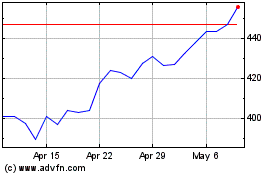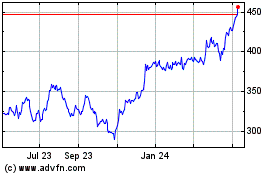Morgan Stanley to Cut a Quarter of Bond, Currency Trading Jobs
November 30 2015 - 8:30PM
Dow Jones News
Morgan Stanley plans to slash hundreds of jobs from its debt and
currencies division, people familiar with the matter said,
revealing that the Wall Street firm believes that a monthslong
slump in trading revenue may persist.
Morgan Stanley company could eliminate as much as a quarter of
the business's workforce, the people said Monday. The cuts will
occur across all of the division's offices, and on each of the
firm's trading desks, though London is expected to bear a slightly
bigger brunt than New York, the people said.
The potential cuts reflect Morgan Stanley's acceptance that a
slowdown in client activity that took root during the summer months
may not reverse any time soon. The New York firm also faces
pressure from investors to lift its returns on equity that have
often languished below a 10% target set by James Gorman, Morgan
Stanley's chairman and chief executive.
New capital rules have penalized big banks for holding vast
inventories of bonds and other debt securities, forcing them into
difficult decisions on how big their trading businesses can remain
in the postcrisis era.
"Many investors have been waiting for them to take more drastic
action," Steven Chubak, an analyst with Nomura Holdings, said of
Morgan Stanley. "It doesn't suggest they expect a continued decline
in the 2015, but it does suggest they don't expect to see a
meaningful recovery in the near or intermediate future."
Mr. Chubak estimates that Morgan Stanley's fixed-income arm will
post a 5% return on equity this year. Overall, the firm's return on
equity is expected to be around 9%.
Colm Kelleher, president of Morgan Stanley's investment-banking
and securities businesses, said earlier this month the firm has
wrestled with how to size its fixed-income arm as the pool of
trading business up for grabs continues to shrink.
"The available fee pool in fixed income historically was assumed
to be about $150 billion to $160 billion," Mr. Kelleher said. "The
last three years it's been $100 billion or less."
All of the banks, from Goldman Sachs Group Inc. to Deutsche Bank
AG, have shrunk their fixed-income business since the financial
crisis. But the market has continued to contract, leaving those
firms and executives with a difficult decision to cut further or
try to ride out what could be a temporary slowdown.
Trimming costs, either from smaller bonuses or fewer employees,
could help boost returns. The potential job cuts, which were
reported initially by Bloomberg News, helped lift Morgan Stanley's
shares 1.6% on Monday.
Investors, corporate executives, central bankers and others have
watched closely as big banks ease their commitment to fixed-income
trading. Some fear that a reduction in overall bank trading will
make it harder to buy and sell bonds at a reasonable price and
exacerbate market volatility when interest rates move.
The year started well for debt traders at Morgan Stanley, and
across Wall Street. The firm's executives believed they would gain
a bigger share of clients' business over time, thanks to a
credit-rating upgrade that made Morgan Stanley a more attractive
trading partner and the gradual retreat from trading by some of its
main European rivals. A strong first half, during which the firm's
fixed-income unit posted its best results in four years, bolstered
that outlook.
Then, Morgan Stanley posted a 42% drop in fixed-income trading
revenue in the third quarter, more than some rivals.
On Oct. 1, the firm said Edward Pick, head of equities trading,
would also oversee fixed income.
The last quarter "was clearly very weak, and I don't think Q4 is
going to be much better," Mr. Kelleher said during a Nov. 17
conference with investors.
"What I don't know yet is: What is the steady run rate of what
we think fixed income should be? What is that number, and how do
you size? But clearly, you have to adjust in accordance with market
conditions for the foreseeable future."
Wall Street's bond, currencies and commodities trading desks
already have been a frequent target for job cuts. Coalition Ltd., a
research firm, estimated in February that fixed-income headcount
dropped 9% last year across 10 of the world's largest banks.
It is unclear, though, whether Morgan Stanley will make
corresponding cuts to its balance sheet—a step that would free up
capital. The firm has already sharply cut the capital it allocates
to the fixed-income business.
Write to Justin Baer at justin.baer@wsj.com
Access Investor Kit for "Deutsche Bank AG"
Visit
http://www.companyspotlight.com/partner?cp_code=P479&isin=DE0005140008
Subscribe to WSJ: http://online.wsj.com?mod=djnwires
(END) Dow Jones Newswires
November 30, 2015 20:15 ET (01:15 GMT)
Copyright (c) 2015 Dow Jones & Company, Inc.
Goldman Sachs (NYSE:GS)
Historical Stock Chart
From Mar 2024 to Apr 2024

Goldman Sachs (NYSE:GS)
Historical Stock Chart
From Apr 2023 to Apr 2024
